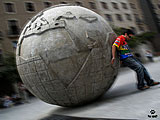How Opinion Polls Shape the International System
24 May 2011
By Fergus Hanson for ISN
We take opinion polls for granted these days - they are taken everywhere, all the time and cover every topic imaginable. Readers from democratic countries staring down the barrel of an election year may even grow weary of them. But consider what the world was like before polls and the subsequent impact they have had on the international system.
Before scientific polling was developed, it was nearly impossible for governments to unmask with some degree of certainty what voters were thinking on a national scale. Take President Franklin D Roosevelt (FDR), who frequently encouraged the American public to write to him personally about their concerns in an effort to gauge their feelings. His daily external pagemail countcall_made averaged a whopping five- to- eight thousand items. FDR kept close tabs on these communications, ordering the mailroom to do daily tallies on the topics they covered. In addition to these quasi-scientific means of gauging public sentiment, the president would also try to sample the mail by dipping his arm into a mass of letters and selecting one at random.
The problem the president faced clearly had to do with his sample. How could he get a representative sense of what the American public was thinking from the few people educated and bothered enough to write in to him?
Before nationally representative samples were developed, the opposite approach - of using giant sample sizes - also proved external pagedisastrouscall_made. In 1936, the Literary Digest in the US made a hugely inaccurate prediction of the presidential race. It analyzed over two million ballots, but had relied on ballots sent to telephone subscribers and car owners who, in an America still recovering from the Depression, did not represent the whole electorate. The Digest predicted Republican Alf Landon would win in a landslide. However, FDR did win and became the longest-serving president in US history.
Into this vacuum stepped people like George Gallup, who used much smaller - but carefully designed - samples that were nationally representative.
Polling on the world stage
The rest of course is history. Polling is now ubiquitous in the domestic context, but its role in the international realm tends to escape notice, even though the utility of polling on international issues was apparent to FDR almost from the outset. In 1939, he sent a external pagerequestcall_made to the publisher of The Washington Post, asking him to see if George Gallup would conduct a poll to ascertain the American public′s view about its government's involvement in the war in Europe - and report the findings to the White House.
Gallup polls in 1939 revealed signs that parts of the American public were moving away from isolationism. Fifty-seven percent agreed, for example, with changing the neutrality law to allow the US to sell war materials to England and France, and a large majority (69 percent) was in favor of doing everything possible to help Great Britain and France to win the war - except going to war themselves.
Since then, the US has conducted regular opinion polls in other countries to help inform its foreign policy. The State Department makes regular use of public opinion polls and also external pagecommissionscall_made its own polling through the Office of Opinion Research, which has a staff of around 40 people and a budget of $11.6 million (although not all of these resources are specifically dedicated to polling).
And the US is not the only government doing this. The Japanese government also regularly conducts opinion polling in other countries, and unlike the US, reports most of its results publicly. Its Ministry of Foreign Affairs conducts three opinion polls a year, last year in the external pageUScall_made, external pageRussiacall_made and external pageAustraliacall_made.
These polls are used to keep track of foreign populations' attitudes toward Japan, track changes in sentiment and also to test new public diplomacy campaigns before they are rolled out. For example, in last year's poll in Australia, the Japanese foreign ministry tested the Australian population's interest in J-pop (Japanese pop music) and Manga (Japanese comic and print cartoons) ahead of a planned promotion of these cultural exports by the Japanese government.
The value of certainty
Beyond the more obvious insights that polling can provide foreign ministries, it is also possible that opinion polls provide some degree of surety to the international community.
Polls let other countries know that things are more or less on track - and provide warning when they are not. When the first Lowy Institute Poll was released in external page2005call_made during a period of rising disenchantment with the Iraq war and the Bush presidency, its findings, which showed relatively poor sentiment toward the US, resulted in headlines like this one on the front page of the International Herald Tribune: "external pageAustralians view US as a threat to peacecall_made".
Australian-American media magnate Rupert Murdoch was reportedly so surprised by the findings that he raised the issue with the American Australian Association in New York. The issue was subsequently taken up with then-Australian Prime Minister John Howard who, a year later, announced the creation of an A$25 million endowment to establish a United States Studies Centre to increase understanding of the US in Australia.
Polls also provide a level of surety by informing policymakers how countries are likely to behave. With data on prevailing public sentiment on an issue, policymakers can get a reasonable idea about the domestic incentives and restraints foreign leaders will have to take into account when making foreign policy.
Of course, public opinion isn't everything. Leaders often act in defiance of prevailing majority opinion - think the Iraq war - and polls are just one tool in the policymaker's kit. Still, they have become an accepted - even if sometimes unwanted - part of the democratic process, and can be very handy when it comes to making foreign policy.

